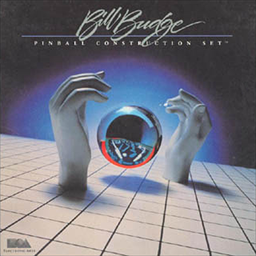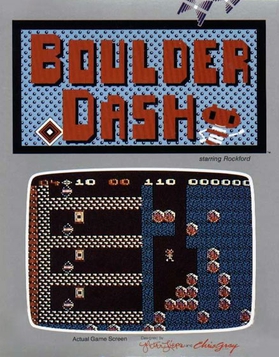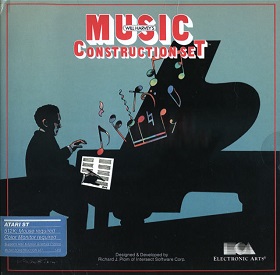
The Commodore 64, also known as the C64, is an 8-bit home computer introduced in January 1982 by Commodore International. It has been listed in the Guinness World Records as the highest-selling single computer model of all time, with independent estimates placing the number sold between 12.5 and 17 million units. Volume production started in early 1982, marketing in August for US$595. Preceded by the VIC-20 and Commodore PET, the C64 took its name from its 64 kilobytes(65,536 bytes) of RAM. With support for multicolor sprites and a custom chip for waveform generation, the C64 could create superior visuals and audio compared to systems without such custom hardware.

Commodore International Corporation was a Bahamian home computer and electronics manufacturer with executive offices in the United States founded by Jack Tramiel and Irving Gould. Commodore International (CI), along with its subsidiary Commodore Business Machines (CBM), was a significant participant in the development of the home computer industry in the 1970s to early 1990s. In 1982, the company developed and marketed the world's second-best selling computer, the Commodore 64, and released its Amiga computer line in July 1985. Commodore was one of the world's largest personal computer manufacturers, with sales peaking in the last quarter of 1983 at $49 million.

Pinball Construction Set is a video game by Bill Budge written for the Apple II. It was originally published in 1982 through Budge's own company, BudgeCo, then was released by Electronic Arts in 1983 along with ports to the Atari 8-bit computers and Commodore 64.

Boulder Dash is a 2D maze-puzzle video game released in 1984 by First Star Software for Atari 8-bit computers. It was created by Canadian developers Peter Liepa and Chris Gray. The player controls Rockford, who collects treasures while evading hazards.

Choplifter is a military themed scrolling shooter developed by Dan Gorlin for the Apple II and published by Broderbund in 1982. It was ported to Atari 8-bit computers the same year and also to the VIC-20, Commodore 64, Atari 5200, ColecoVision, MSX, and Thomson computers.

One on One: Dr. J vs. Larry Bird, commonly known as One on One, is a basketball video game written by Eric Hammond for the Apple II and published by Electronic Arts in 1983. It was initially ported to the Atari 8-bit computers, ColecoVision, Commodore 64, and IBM PC compatibles. Versions followed for the TRS-80 Color Computer, Classic Mac OS, Amiga, and ZX Spectrum. In Europe, the publisher was Ariolasoft. Atari Corporation released an Atari 7800 port in 1987.

Will Harvey's Music Construction Set (MCS) is a music composition notation program designed by Will Harvey for the Apple II and published by Electronic Arts in 1983. Harvey wrote the original Apple II version in assembly language when he was 15 and in high school. MCS was conceived as a tool to add music to his previously published game, an abstract shooter called Lancaster for the Apple II.

Spinnaker Software Corporation was a software company founded in 1982 known primarily for its line of non-curriculum based educational software, which was a major seller during the 1980s. It was founded by chairman Bill Bowman and president C. David Seuss.
HomePak, published in 1984 by Batteries Included, is an integrated application written for the Atari 8-bit computers and ported to the Commodore 64, Commodore 128, IBM PCjr, and Apple II. It includes a word processor (HomeText), database (HomeFind), and terminal communications program (HomeTerm). HomePak was designed by Russ Wetmore for Star Systems Software, Inc. The Commodore 128 version was ported by Sean M. Puckett and Scott S. Smith.
Synapse Software Corporation was an American software developer and publisher founded in 1981 by Ihor Wolosenko and Ken Grant. Synapse published application software and developer tools and was primarily known for video games. It initially focused on the Atari 8-bit computers, then later developed for the Commodore 64 and other systems. Synapse was purchased by Broderbund in late 1984 and the Synapse label retired in 1985.

Frogger II: ThreeeDeep! is a video game released in 1984 by Parker Brothers for the Apple II, Atari 8-bit computers, Atari 2600, Atari 5200, ColecoVision, Commodore 64, and IBM PC compatibles. It is a sequel to the 1981 Konami Frogger arcade video game and has similar gameplay.

Datamost was a computer book publisher and computer game company founded by David Gordon and based in Chatsworth, California. Datamost operated in the early 1980s producing games and other software mainly for the Apple II, Commodore 64 and Atari 8-bit computers, with some for the IBM PC. It also published educational and reference materials related to home computers and computer programming.

Many games, utilities, and educational programs were available for Atari 8-bit computers. Atari, Inc. was primarily the publisher following the launch of the Atari 400/800 in 1979, then increasingly by third parties. Atari also distributed "user written" software through the Atari Program Exchange from 1981 to 1984. After APX folded, many titles were picked up by Antic Software.

Home computers were a class of microcomputers that entered the market in 1977 and became common during the 1980s. They were marketed to consumers as affordable and accessible computers that, for the first time, were intended for the use of a single, non-technical user. These computers were a distinct market segment that typically cost much less than business, scientific, or engineering-oriented computers of the time, such as those running CP/M or the IBM PC, and were generally less powerful in terms of memory and expandability. However, a home computer often had better graphics and sound than contemporary business computers. Their most common uses were word processing, playing video games, and programming.

Batteries Included was a computer software and hardware company based in the Toronto area. It developed products for the Apple II, Atari 8-bit computers, Atari ST, Commodore 64, and MS-DOS. The company was best known in the 1980s for its PaperClip word processor, which was available for the Atari 8-bit family and Commodore 64, and the DEGAS bitmap painting program for the Atari ST. Batteries Included was acquired by Electronic Arts in 1987.

Snooper Troops is a series of two 1982 adventure/educational video games developed by Spinnaker Software and published by Computer Learning Connection. They were released for the Apple II, Atari 8-bit computers, Commodore 64, and MS-DOS. The first case was entitled Snooper Troops: Case #1: The Granite Point Ghost and the second case entitled Snooper Troops: Case #2 - The Case of the Disappearing Dolphin was released later that year.
Springboard Software, inc. was a software company founded in 1982 known primarily for its line of non-curriculum based educational software. It was bought by Spinnaker Software in 1990.
Movie Maker is a computer program published by Reston Publishing Company in 1984 which allows users to author animated visual sequences with audio. Self-playing movies can be viewed without the Movie Maker software. It was developed by Interactive Picture Systems for Atari 8-bit computers. In 1985 it was re-published by Electronic Arts, including a port to the Commodore 64.

Monster Smash is an action game written by Dave Eisler and published by Datamost in 1983 for the Apple II and Atari 8-bit computers. A Commodore 64 port followed in 1984. The music in the Atari 8-bit version was written by Gary Gilbertson and praised by reviewers. An earlier version of the game was published by The Software Farm in 1982 as Monster Mash.














